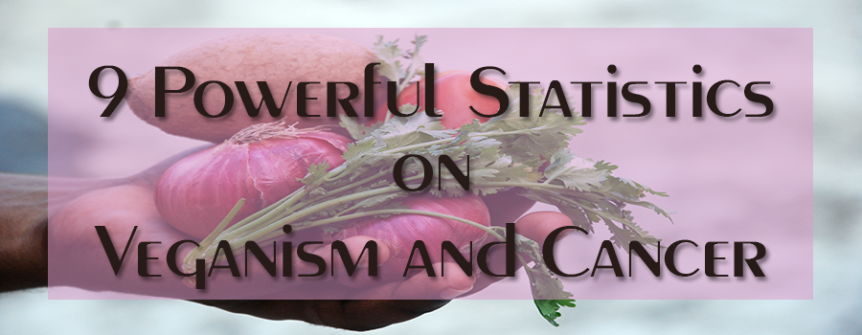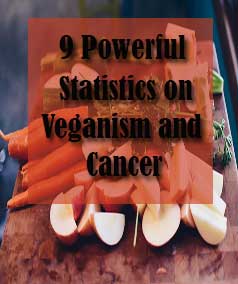Science has shown that a meat-free, plant-based diet can reduce the risk of developing cancer or help conquer it when it does occur. In addition to the above video, here are 9 statistics from scientific studies published in peer-reviewed journals. A few of them are not necessarily vegan studies, but all have to do with plant-based diets.
-
A vegan diet inhibits the growth of prostate cancer cells 8 times more than a control group.
In this study, patients with prostate cancer who did not undergo conventional therapy were put on a lifestyle modification regimen for 1 year which included:
- vegan diet supplemented with soy (tofu)
- fish oil (3g daily)
- Vitamin E (400IU), Vitamin C (2g daily), and selenium (200 mcg daily)
- Moderate aerobic exercise (walking 30 min./day, 6 days a week)
- stress management techniques (yoga, meditation) – 60 min./day
- participation in a 1-hour support group weekly
Results:
- PSA (a marker for prostate cancer) decreased 4% in the vegan-diet group, but it increased 6% in those on a standard diet.
- Prostate cancer cell growth was inhibited by 70% in the vegan group, compared to 9% in the standard-diet group.
-
A high-fiber, low-fat diet decreased the growth of 3 different types of breast cancer cells, and reduced estradiol hormone, insulin levels, and levels of IGF-1 in just 2 weeks.
In this study, participants were put on a high-fiber, low-fat diet that consisted of:
- 10-15% fat (polyunsaturated)
- 15-20% protein, mainly from a plant source
- 2 servings of nonfat milk
- no more than 3.5 oz. of fish or fowl
- 70-75% carbohydrates in the form of vegetables, fruits, legumes, and whole grains.
- They also exercised 30-60 min./day, 4-5 days per week.
Results: In just 2 weeks,
- Growth of breast cancer cells (3 different kinds) decreased by 6.6%, 9.9%, and 18.5%, respectively
- Estradiol hormone was decreased in the blood (estradiol promotes growth of breast cancer cells)
- Insulin and insulin-like growth factor 1 (IGF-1) were significantly reduced. IGF-1 is a potent activator hormone for the development, progression and metastatis of cancer.
Read the study here.
-
Low-protein diets (plant protein) are correlated to lower levels of IGF-1 (a cancer promoting hormone), lower incidence of cancer, and decreased mortality in people under age 65. Adults older than age 65 need higher levels of protein.
In this study, 6,381 adults were studied over a 18-year period. Those on a high-animal-protein diet showed a 74% increase in overall mortality and were 4 times more likely to die from cancer than those on a low-protein diet. Those on a plant-based protein diet (even if it was high-protein) did not show these elevated risks. Low-protein dieters also showed significantly reduced levels of IGF-1 hormone.
Read the study here. -
A vegan diet leads to lower fecal pH which is associated with a lower incidence of colon cancer.
This study tested 12 males. They tested them on a vegan diet, a lacto-vegetarian diet, and a standard western diet. The vegans showed the lowest fecal pH values, followed by the vegetarians, and the standard dieters had the highest level. The lower the pH, the lower the rate of large-bowl cancers.
Read the study here. -
Vegetarians have a lower risk of esophageal, liver, colorectal, and lung cancers (ranging from 20-60% lower) than those who ate significant amounts of red meat.
Read the study here.
-
Vegetarians have a lower risk of colon (88% lower), prostate (54% lower), pancreatic, and bladder cancer (2 times lower) than meat eaters
In this study, 34,192 Seventh Day Adventists were studied for 6 years. Meat eaters were compared to vegetarians. It was found that vegetarian women lived an average of 2.52 years longer than their non-vegetarian counterparts, and vegetarian men lived 3.21 years longer than the male meat-eaters.
Read the study here. -
Switching from a conventional diet to a raw vegan diet changes the metabolism of gut bacteria which results in lower bacterial enzymes and toxic by-products which decreases colon cancer incidence.
This study analyzed the fecal matter of 18 subjects who went on a raw vegan diet for one month then switched back to a standard diet for another month. By analyzing the feces, the researchers measured changes in the metabolism of the bacteria that live in the intestines. The study showed a substantial decrease in bacterial toxicants and carcinogens (cancer-causing substances) while following the raw vegan diet, but those results disappeared 2 weeks after switching back to a standard diet.
Read the study here. -
Breast cancer patients who switched to a low-fat, high-fiber vegetarian diet showed a 68% decrease in serum estradiol (estradiol helps breast cancer grow and spread).Also, the occurence of new cancer formation was significantly reduced in women who ate the most fruits and vegetables.
In this study, 3,109 women who had a breast cancer diagnosis were put on a low-fat, high-fiber diet that consisted of:
- 5 vegetable servings daily
- 16 oz. vegetable juice
- 3 servings of fruit
- 30g dietary fiber
- no more than 15-20% calories from fat
In the diet group, estradiol levels fell from 41 pmol/L to 28 pmol/L, a 68% decrease. Additionally, those with high levels of carotenoids in their blood (indicating high intake of fruits and vegetables) had a statistically significant lower incidence of new tumor formation.
Read the study here. -
Vegetarians in the UK showed a 30% lower risk of all cancers than meat eaters.
In this study, 6115 vegetarians were compared with 5015 meat-eaters in the United Kingdom. Values for all cancers were 50 for vegetarians and 80 for meat-eaters.
Read the study here.




